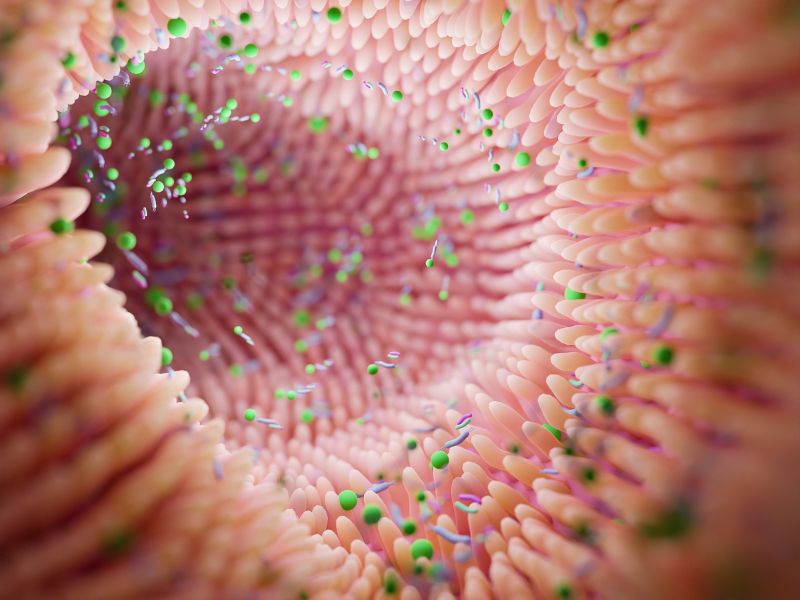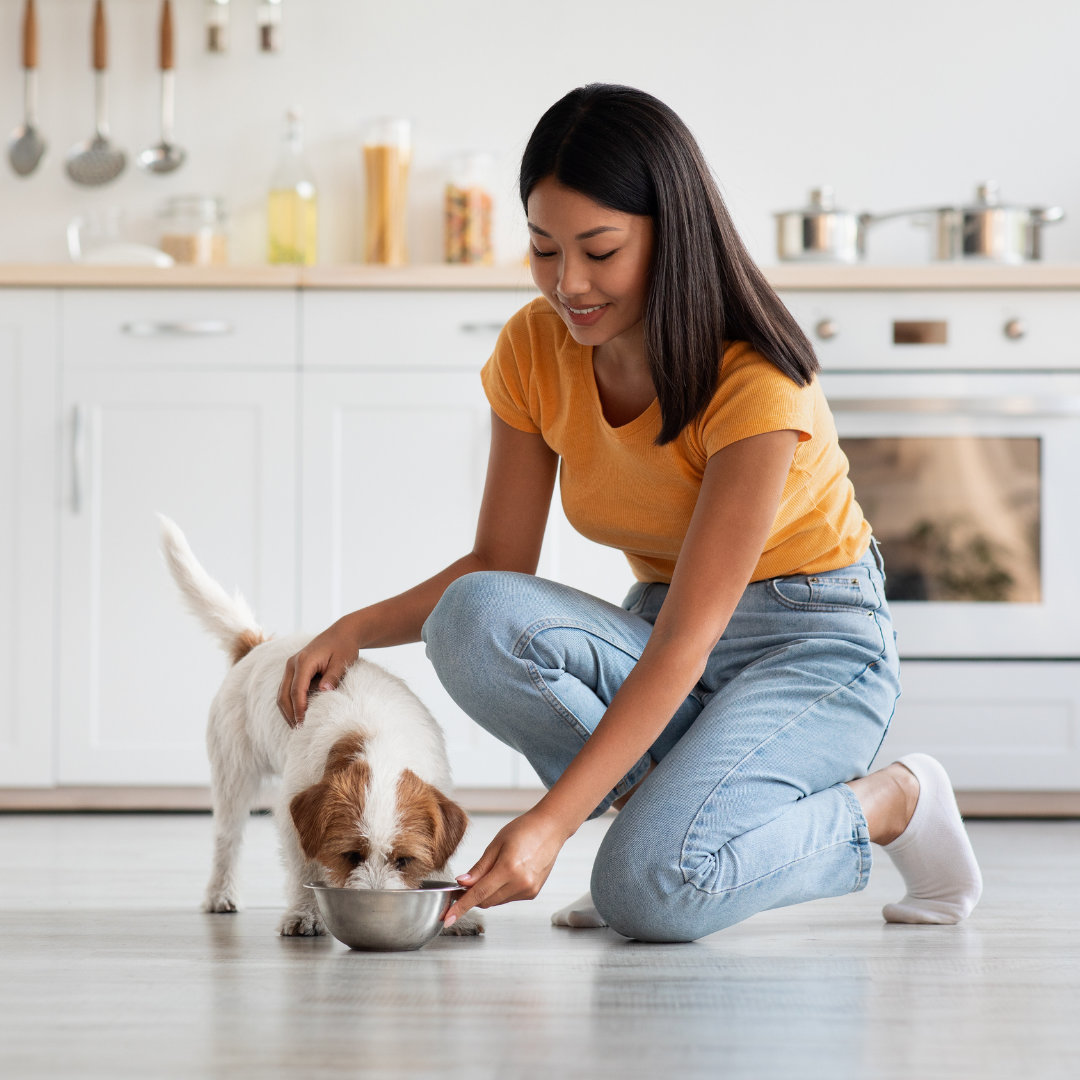When it comes to good dog gut health, it’s important to know how long it takes for a dog to properly digest dog food. Why’s that? Well, nutrient absorption is KEY for your dog’s immunity and overall health, and the best nutrient absorption happens when the canine digestive system is working efficiently and effectively! Dog digest time matters!
Continue reading to find the answer to the “How long does it take a dog to digest food” question!
Your dog’s immune system and digestive system are linked
Science continues to show the connection between a dog’s digestive and overall health. [1] [2] [3] There’s a lot to be said when we say, “We are what we eat,” and that goes for dogs too. Dog owners know that feeding their pets the best dog food is crucial for them to have fuel to run and play, but the wet food and dry food you feed your doggy won’t effectively fuel him if their digestive system isn’t healthy and functioning. The proper food intake and supplements keep his digestive health in check, and that’s key to their overall health and vitality.
What happens if your dog’s digestive system isn’t healthy?
If your pet’s digestive intestinal tract isn’t healthy, you’ll probably know it pretty quickly. Their stool will likely smell and be pretty disgusting. They may suffer from diarrhea or constipation. They may suffer from bloating or vomiting or even struggle with the symptoms of Leaky Gut. How do you make sure your pet’s digestive system is healthy and the digestive cycle is functioning well? Well, the first step is making sure it digests foods appropriately and at the right speed for maximum nutrient absorption.
What happens when my dog digests food?
How does a dog break down food? And even more, how long does dog digestion take? The answers to that all depend on your pup’s gut health. How can you tell if a doggy’s gut is healthy?
If you’re dealing with issues like acid reflux, allergies, or even coprophagia (eating poop), your pup’s gut may not work normally. So, how does a dog’s digestive system work?
First, when your dog eats, food enters his mouth. They *chew* and break the food into smaller pieces to begin digestion. (Fun fact: dogs can’t chew from side to side, and really, they don’t do much *chewing* at all. They do more *ripping* apart of the food.) As food is broken down, it’s swallowed and then travels down the esophagus to get into the stomach (where partially digested food is stored). In the dog’s stomach, stomach acid works to break down the chewed food so that it’ll be absorbable when it gets to the small and large intestines. When the chewed food gets into your dog’s intestines, that’s where absorption starts.
The small intestine is where most of the absorption begins. Your pet’s gallbladder creates bile and adds it to the chewed food mix to balance the acidity of any remaining stomach acid. His pancreas secretes enzymes that continue to break and separate the food to the smallest parts it can be so that it can be fully digested and absorbed. Chemical reactions inside the small and large intestines then allow the essential nutrients to be absorbed by the walls of your pet’s intestines. This is how the absorbable nutrients get into your pup’s blood system and then can be carried throughout his body to be used for fuel and function.
Whatever can’t be absorbed or broken down or has no nutritional value gets pushed through your pet’s large intestines. Here, any water or food that can be absorbed is, and whatever can’t be is…. you guessed it! Poop! This is why your dog’s stool (or fecal matter) looks like it does (or should). It’s taken quite a trip through the twists and turns of your dog’s digestive tract system and is stored in his rectum. When there’s enough poop hanging out in your dog’s rectum to trigger the urge to poop, he’ll poop. That’s how he gets rid of waste, and how long it takes him to go through this digestive process tells about his gut health.
How long does it take for a dog to digest food?
Generally speaking, if your pet’s gut is healthy, it should take about 6-10 hours to digest food properly. Small dogs and puppies might take less time (around 4 hours or so) than larger, adult dogs. (Another fun fact: dogs generally digest their food three times faster than humans!) Be careful if your dog throws up undigested digested food though as it won’t be absorbing any nutrients.
But that’s if its gut is healthy. Other significant factors may affect a dog’s digestion time –puppies and adult dogs often have different dog poop cycles.
Some dog breeds take longer (or less) time because of their size and the size of their intestines. Some dogs have health conditions that may make their poop cycles longer or shorter. But the biggest factor that affects how long it takes a dog to digest food is their gut health.
Eating highly digestible food (a food that is more absorbed by your pet’s body, typically measured in percentages for digestibility) will help because you’re already starting with a propensity for digestion. And premium supplements like Bernie’s Perfect Poop help your dog’s food digest at the perfect speed for maximum absorption. Enhanced food digestibility prevents digestive problems in dogs.
Canine digestion time vs. human digestion
When comparing the digestive systems of canines and humans, observing how each species has evolved to meet its dietary needs is actually pretty fascinating. Typically, dogs digest food faster than humans do. One reason for this is their evolutionary lineage as carnivores, whereas humans evolved as omnivores. A dog’s gastrointestinal tract is designed to process meat quickly to extract essential nutrients, so there’s less time in transit to get to the end result of pooping. The human digestive system differs because it has adapted to handle a wider variety of foods, including plant-based sources, and consequently has a more extended digestion process. In essence, we’ve got the luxury of digesting a little more leisurely, from an evolutionary standpoint.
Fiber, which is primarily found in plant-based foods and a main ingredient in Bernie’s Perfect Poop, is essential for human digestion as it aids in bowel movements, helps maintain stable blood sugar levels, and promotes a healthy gut microbiome. Good gut health is crucial for both human and dog, and is characterized by a balance of beneficial bacteria. Having good gut health aids in nutrient absorption, immune function, and overall well-being. And while the specifics of canine and human gut health differ, the fundamental principle remains: a balanced diet with appropriate fiber, pre- and probiotics and digestive enzymes promotes optimal digestion and health.
Ways to improve your dog’s digestion
We all want the best dog digestion for our best friends, and there are things we can do to help our dog’s stomach and digestive process. Here are some tips for helping your dog have a healthy digestive tract and dog digestion:
- High Protein, Low Fat Diet: Dogs eat primarily to fuel their energy, so protein is a win for them. Ensure it’s balanced with a low fat content to keep their digestion optimal.
- Plenty of Exercise: Just as a good stroll does wonders for us, a run or walk for dogs not only keeps them active but also aids in digestion by keeping those digestive juices flowing.
- Avoid Stress: Our four-legged pals can get stressed too, and this can wreak havoc on their digestive system. Keep their environment calm and comfortable.
- Consider Going Grain-Free: While it’s not a one-size-fits-all solution, some dogs benefit from a grain-free diet. It’s worth exploring if you notice digestive issues with your dog, and something you can talk to your vet about too.
- Prioritize High-Quality Ingredients: Your dog deserves the best. Always ensure that the food they’re consuming is made of high-quality ingredients that will benefit their overall health. They digest better, and mean less waste in the end.
- Avoid Human Food: It might be tempting to share, but dogs’ systems aren’t cut out for our kind of grub. Human foods, especially certain types, can be harmful and disruptive to their digestion.
- Stay Hydrated: Never underestimate the power of water. Ensure your dog is properly hydrated throughout the day. It plays a crucial role in their digestion and overall well-being.
Digestive issues in dogs
But what happens when Fido’s tummy isn’t feeling its best? Well, there are several digestive issues dogs might experience. Diarrhea and constipation are pretty straightforward signs. Vomiting or regurgitation can hint at what’s going wrong internally. If you ever spot bleeding or notice abdominal pain and bloating, it’s a red flag and you should talk to your vet as soon as possible. Are they straining to defecate? Not a good sign either. In severe cases, signs of shock and dehydration can indicate serious digestive disorders. Here’s the deal: our dogs eat various things, some of which might not be the best for them. That’s why monitoring their internal health is essential. Your dog’s digestion isn’t just key to the perfect poop, but to their overall health too. The way they digest food says a lot about their digestive health, of course, but that also says a lot about their overall well-being even more.
Your dog’s diet should change with age
And…a word about our senior best friends. Just as humans change their eating habits as they age, a dog’s diet should adapt to optimize its health. Typically, by the age of 7, or even sooner for some breeds, their dietary needs start to shift. It might sound surprising, but that’s the age many canines officially become ‘senior’! Older dogs often have more sensitive stomachs, and issues like weight gain become more prevalent. Their bodies aren’t as efficient in producing certain digestive juices, and they might not burn calories as they once did. With these changes, it’s often a good time to think about switching to a diet specifically designed for senior dogs. It’s all about ensuring our old pals remain as spry and happy as they deserve.
How does Bernie’s Perfect Poop help a dog digest food?
Bernie’s Perfect Poop helps your doggy digest food at just the perfect speed for maximum absorption. When you give your pup Perfect Poop, it does this by adding premium fiber, pre- and probiotics, and digestive enzymes to every bite.
Fiber is key to ensuring that food doesn’t go through your dog’s digestive system too fast or too slow. It makes sure that there’s enough water in the digesting food to move through efficiently (and can help eliminate improper digestion, which may lead to constipation and diarrhea). Pre- and probiotics help your doggy’s gut thrive with beneficial bacteria. When your pet’s gut is thriving, there’s less likely he’ll suffer from Leaky Gut because the flourishing microbiome is the optimal environment for maximum nutrient absorption.
Bernie’s Perfect Poop also has the perfect combination of digestive enzymes that help your dog’s food gets broken down for premium absorption. Think of them as super boosters to the enzymes your dog begins producing as he starts the dog’s digestive process–they help break the food down so nutrients can be more easily absorbed.
And all of this adds to your dog’s overall health! If your dog’s digestive system isn’t healthy, though, there could be problems with your pet’s health. Much like Goldilocks with all of Baby Bear’s things, Bernie’s Perfect Poop helps optimize your dog’s digestion process every time!
[1] The Role of the Canine Gut Microbiome and Metabolome in Health and Gastrointestinal Disease
[3] Role of gut microbiota in dog and cat’s health and diseases


